I wanted to title this essay “How my Crude, Cynical, Obtuse, Straight Japanese Friend Gives me Hope about the Future of LGBT Rights in Japan,” but in the spirit of progress, this message sent by text to a friend (with a more colorful word after “one”) seemed more fitting.
With the arrival of marriage equality in the United States, perhaps the moment is timely to talk about the gay rights movement in Japan, or lack thereof.
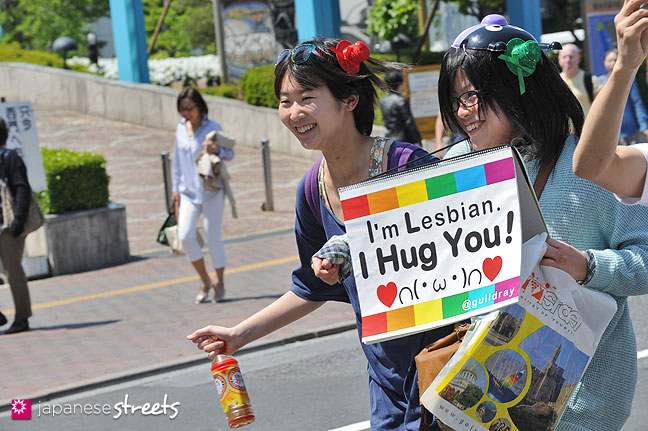
Pride Month Celebrations began in 2010 in Japan. Source
Well, it exists. But it’s in its infancy.
While they don’t experience the open persecution seen in Russia, the Middle East, and parts of Africa, LGBT people in Japan are locked in the prison of strict social customs. Most gay men in Japan seem to either be foreigners or partially to completely in the closet, which is why I’ve had to change their names in this post. They probably have a long way to go in an isolated, patriarchal society where older people hold all the keys over a submissive youth.
But the tide will turn, and I know that because of Yuu Koyama.
Some have read my tales about Koyama before. A few of my readers have met him. Koyama is straight – perhaps offensively so, routinely running into roadblocks in his attempts to attract women. He is one of the crudest, craziest people I have ever met, unlike all Japanese people in his forward attitude, meat-headed nature, unpredictably wild behavior, and ability to trivialize anything. Koyama has never shied away from anything – except gay people.
Indeed, Koyama made his homophobia pretty apparent the night I met him. Yet he made so many crude comments on so many different topics that the few homophobic tangents he briefly dwelled on were drowned out. They were smothered by long rants of his (desired) sexual encounters with various women, spoken with spectacularly little vocabulary and no grammatical construction. An English beginner when I met him, he was restricted to as many verbs as his surprisingly robust arsenal of curse words and slang, picked up during snowboarding stints with rambunctious foreigners.
He soon became my best friend in Kyoto, in spite of our divergence on the issue of gay rights.
But in the first year I have known him, there has been a dramatic and beautiful change in this man. It’s the kind of change many of us westerners have been witnessing for the past 15 years in our own countries. He’s come a long way.
“Batty boy!” Koyama declared to me, on a train across the country, two months after I met him.
Traveling together for the first time, Koyama had called me something that I had never heard before.
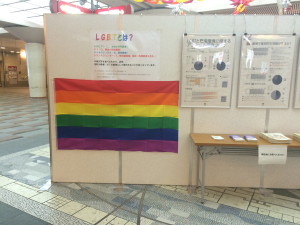
Kyoto City Hall Station: This weeklong display was the only LGBT promotional material I have seen in public in Japan.
Repeating it gave no clarification. “Faggot!” he chose instead, but my confusion was sustained. I made him write down the first phrase and I looked it up, there learning that batty boy is the harshest Jamaican-English slur for a gay man. Jamaica lags the entire English-speaking world in gay rights and in overcoming discrimination, which might suggest this to be the most offensive English-language term in the world for gay people. It was one of the only times in my life a non-native English speaker taught me English slang.
“Batty boy (hand gesture for “is”) faggot. Disgusting!” Koyama added to his declaration, to make sure he wasn’t disconnecting the word from its association. I was a long way from Boston.
In our early days we did not understand enough of each other’s languages to really discuss politics. In fact I’m still not sure if Koyama is serious when he expresses support for the Japanese Communist Party.
Occasionally in the following months, as his English improved, Koyama was more seriously confronted with the discussion topic of LGBT peoples. He met more of my friends, some of whom were gay, although it may have taken him a long time to notice. And we introduced him to more foreign tourists, with some of whom he eventually shared his views.
One of these encounters was when my friend Lara visited in October, about seven months after I met Koyama.
Lara and I became friends when we studied abroad in France three years ago. Now she lives in Thailand. A beautiful blonde American girl, she was everything Koyama ever dreamed of.
He was on his game, showing his karaoke skills, peeing off bridges, and telling crude stories. In one of those stories was mentioned a gay man.
“I hate gay people,” Koyama added casually. His English had improved.
“How could you say that Koyama?” Lara asked him back.
“They are disgusting. Why? Why fuck guys? No girl fuck?”
“So what?” Lara said. She seemed a little angry. “Who cares?”
This kind of philosophical question didn’t really land with Koyama, as his listening skills were still restricted to basic classroom dialect. But Lara’s cold attitude, after taking so warmly to Koyama’s absurdity prior to those comments, seemed to shut him down. Perhaps on this day Koyama learned homophobia wasn’t attractive to women. At least, western women.
In November, a young man named Jonathan came to Japan and stayed at my apartment, via CouchSurfer. Jonathan traveled from New Mexico, routing through Asia, with Japan as the last stop. He too could not believe the Koyama tales he heard, but grew to accept them as he watched Koyama stand on furniture (a huge Japanese faux-pas), tear apart dance clubs, karaoke the US National Anthem, and somehow party on no money at all.
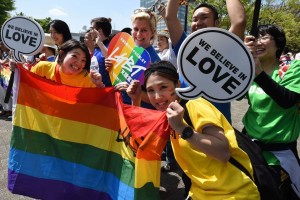
From the Wall Street Journal, Tokyo. Source
When yet another U.S. state legalized gay marriage, Jonathan and I briefly talked about the issue, and as I was very used to doing by this point, simplified the conversation for Koyama to understand. He flirted with new opinions, but only for a second.
“Gay people is…” he said, pausing. Then shaking his head: “I don’t like.”
Jonathan promptly chewed him out. He did so with the kind of passion that spoke of a gay family member or close friend. Whatever it was took Koyama back a step. Having just learned about Jonathan’s girlfriend, Koyama clarified that Jonathan was straight, then said no more, seeming to wonder why straight men were resisting his opinions.
Winter came, as did the onrush of a furious jobhunt. I had less time for my best friend, whose insatiable appetite for partying only grew, along with his English skills.
In early December Koyama invited me on a youth ski trip, seemingly forgetting that I worked Saturdays at my former job.
“Please,” he begged. “We waiting for you.” But there was no way I could go.
“Masaki coming,” he said stiffly. “He is gay. He is try to fuck me.” I wasn’t sure how serious he was. Tolerance and proper use of future tense still evaded him.
Masaki was one of my best friends in Japan. His sexual preferences did not stop him becoming the center of a dozen or so young foreigners determinably chasing Japanese girls. Masaki ran the show (and we’ve suffered since he moved abroad), and this ski trip, with plenty of women already signed up, was no exception. For Koyama there was an almighty dilemma. His two great passions were finally pitted together: snowboarding, and not being near gay people.
With sadness in his heart Koyama accepted that I couldn’t go on the trip with him. He went with Masaki, and a large group of other people he didn’t know. Besides he thought. Many girls to go and I can do fuck.
Although that didn’t become a reality, Koyama had fun, and I was pleasantly surprised to see him go on a similar trip with Masaki and others in February. Koyama eventually became better friends with Masaki’s other gay friends, Alan, Atsushi, and Felix, meeting them at Masaki’s parties.
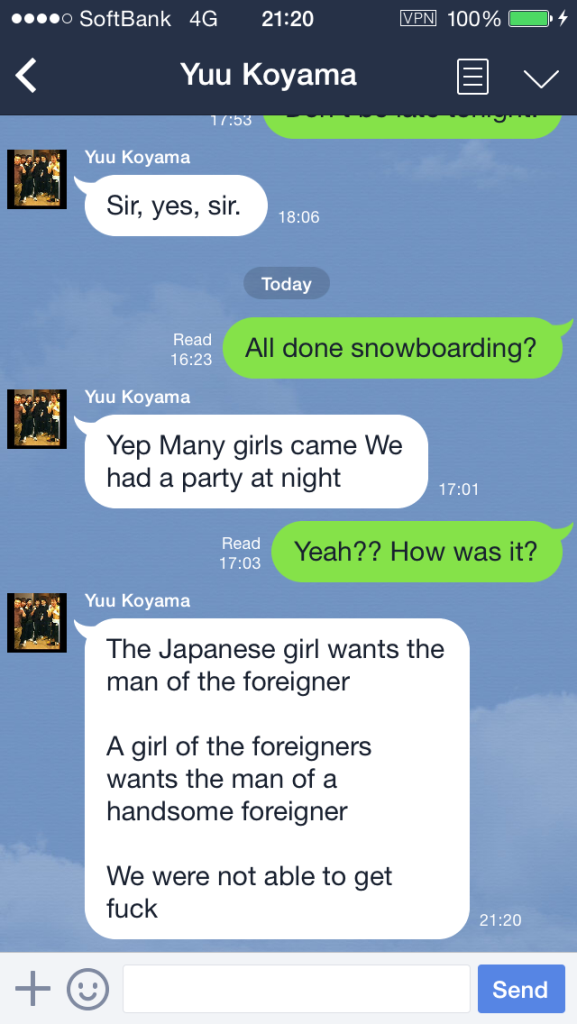 The climax was when Masaki took us to a gay bar. Although Koyama laughed at the idea, I bought Masaki’s solicitations:
The climax was when Masaki took us to a gay bar. Although Koyama laughed at the idea, I bought Masaki’s solicitations:
“There are so many girls there!” Masaki assured us in his characteristically choppy voice. “Always there are many girls there.”
It was packed with men. On this occasion Koyama learned the phrase, “sausage-fest.”
They were happy sausages.
The shock on Koyama’s face, gripping his whole body, was humbling. I had never seen him so defeated. But his brain was working fast.
“In here, many–”
“Don’t say it,” I said.
The men there were very nice to us, but the bar was really small and really full. It was very rainbowy. It was hot. We waited patiently for Masaki to finish his flirting.
I could only imagine Koyama was horrified. Although it would have been nice if he opened his mind to western views on homosexuality, it was by no means my agenda. I reflected guiltily, at that moment, at bringing him into what I assumed was a stressful and uncomfortable situation for him.
Then something amazing happened.
“I used to think gay people is terrible,” Koyama said out of nowhere, in a quiet voice. “But I meet Masaki. Masaki is nice guy.”
He was speaking slowly.
“Alan is nice guy,” he continued.
“Atsushi is nice guy. Felix is nice guy.”
I didn’t know what to say, so I continued to listen.
“Gay is nice people,” he continued. “I like gay people.”
“That’s great man!” I finally said.
“Felix is tough guy. I is think Felix want fuck girls. But, he is fuck guys. Surprised!” finished Koyama, breaking into laughter.
I wondered whether he was laughing because he realized gay men can be perfectly masculine, or simply because Felix actually has sex with other men. But seeing him eventually get along with other gay men at the bar, and also listening to him use “batty boy” even to this day, I realized it didn’t matter.
Because even if he was obtuse enough to laugh at someone for being gay, he was smart enough to still accept them. And if Koyama can change, so can Japan.
Thanks for reading.
@gregnasif
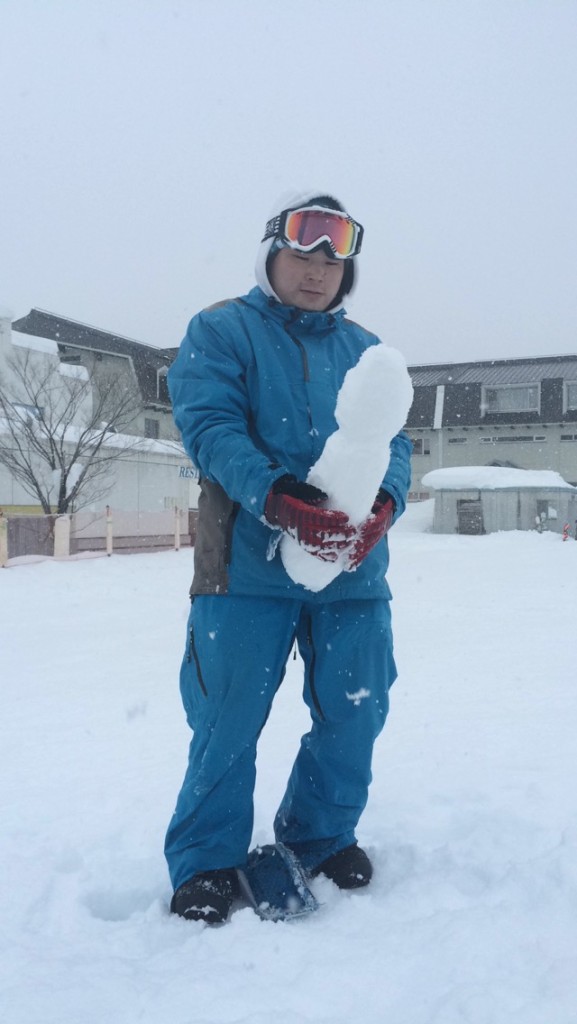
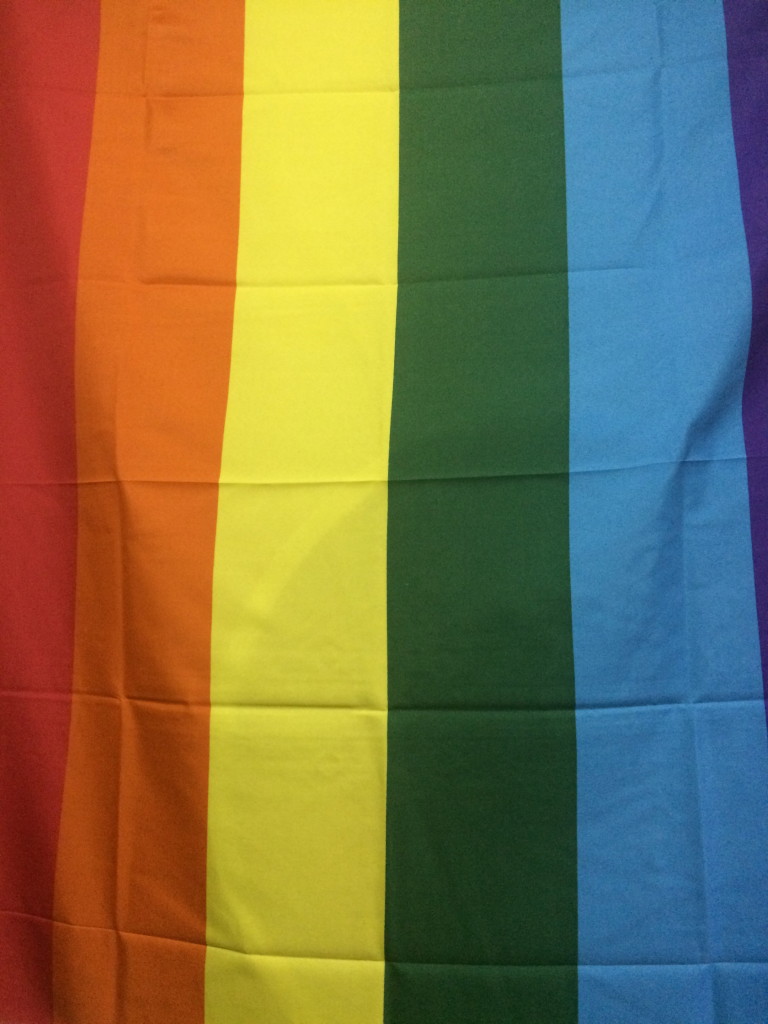
Excellent!